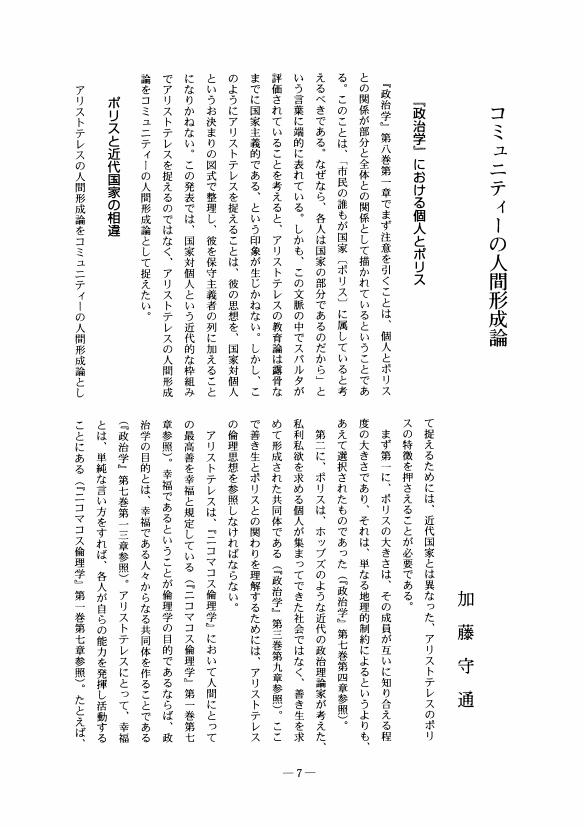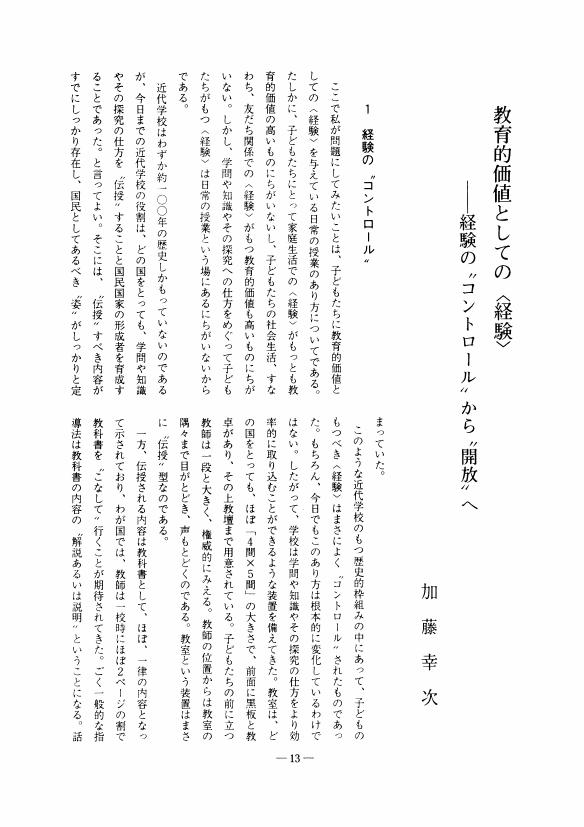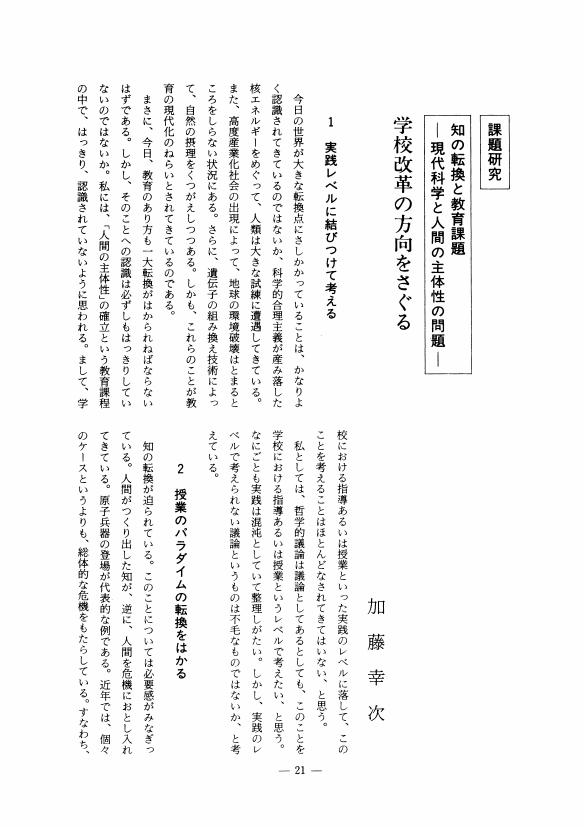1 0 0 0 OA マルクス主義の思想史的位置 (<シンポジウム>国家と個人)
- 著者
- 加藤 尚武
- 出版者
- 東北哲学会
- 雑誌
- 東北哲学会年報 (ISSN:09139354)
- 巻号頁・発行日
- vol.7, pp.49-54, 1991-06-10 (Released:2018-02-28)
1 0 0 0 OA プラトンのテクネーを巡って
- 著者
- 加藤 守通
- 出版者
- 東北哲学会
- 雑誌
- 東北哲学会年報 (ISSN:09139354)
- 巻号頁・発行日
- vol.6, pp.51-52, 1990-06-07 (Released:2018-02-28)
1 0 0 0 OA 古代都市ダルヴェルジン・テパ遺跡出土の新資料
- 著者
- 加藤 九祚 トゥルグノフ B. Kyuzo Kato Bahodir Turgunov
- 出版者
- 創価大学シルクロード研究センター
- 雑誌
- シルクロード研究 (ISSN:13455931)
- 巻号頁・発行日
- no.10, pp.31-40, 2017-02-28
Various kinds of artifacts were excavated by late Dr. Kyuzo Kato and Bahodir Turgunov of the Japan-Uzbekistan Joint Excavation Team at Dalverzintepa, an ancient city in southern Uzbekistan. The finds from remains of this city clarified importance of the Buddhism in the Kushan culture. These new finds are the last contribution to us that Dr. Kyuzo Kato, professor of Soka University brought, who initiated Japanese archaeological research in Central Asia and led archaeological excavations at Dalverzintepa, Karatepa and other sites for many years until his passing away at the age of ninety-four in Termez.
1 0 0 0 OA 乖離の系譜学
- 著者
- 加藤 守通
- 出版者
- 教育哲学会
- 雑誌
- 教育哲学研究 (ISSN:03873153)
- 巻号頁・発行日
- vol.2007, no.95, pp.8-14, 2007-05-10 (Released:2009-09-04)
- 参考文献数
- 9
1 0 0 0 OA 戦争と教育 フーコーからプラトンへ
- 著者
- 加藤 守通
- 出版者
- 教育哲学会
- 雑誌
- 教育哲学研究 (ISSN:03873153)
- 巻号頁・発行日
- vol.2005, no.92, pp.1-21, 2005-11-10 (Released:2009-09-04)
- 参考文献数
- 17
The aim of this article is to show the hidden relationship between war and education in the history of Western thought.In the first chapter we examine and evaluate a thesis developed by Michel Foucault in his lecture at Collège de France, Il faut défendre la société, originally held in 1976 but first published in 1997. According to this thesis, the idea of the struggle between opposing 'nations' or 'societies' within a country, such as between the Normans and the Saxons in England or between the Francs and the Gauls in France played an important role in the formation of modern political and historical thought including Nazism and Stalinism. This thesis can have strong impact to our understanding of modern education.In the second chapter we examine the classical theory of education represented by Plato's paideia and show the crucial role played by war in this theory. For it is only by comparing the soul with a state (polis) divided by the strife between different classes, that Plato was capable of developing his theory of the inner self. The result is of special interest, because Foucault himself viewed Plato as the arch-enemy of the 'historicism' which stand on the side of the above-mentioned modern theory of war.Thus, it is not only in the modern educational thought but also in the classical theory of paideia that war played an important role.
1 0 0 0 OA コミュニティーの人間形成論
- 著者
- 加藤 守通
- 出版者
- 教育哲学会
- 雑誌
- 教育哲学研究 (ISSN:03873153)
- 巻号頁・発行日
- vol.2003, no.87, pp.7-11, 2003-05-10 (Released:2009-09-04)
1 0 0 0 OA 学力の地平論的考察
- 著者
- 加藤 守通
- 出版者
- 教育哲学会
- 雑誌
- 教育哲学研究 (ISSN:03873153)
- 巻号頁・発行日
- vol.2001, no.83, pp.7-12, 2001-05-10 (Released:2009-09-04)
1 0 0 0 OA 教育的価値としての〈経験〉 経験の “コントロール” から “開放” へ
- 著者
- 加藤 幸次
- 出版者
- 教育哲学会
- 雑誌
- 教育哲学研究 (ISSN:03873153)
- 巻号頁・発行日
- vol.1995, no.71, pp.13-17, 1995-05-10 (Released:2010-05-07)
- 著者
- 加藤 守通
- 出版者
- 教育哲学会
- 雑誌
- 教育哲学研究 (ISSN:03873153)
- 巻号頁・発行日
- vol.1992, no.65, pp.1-6, 1992-05-10 (Released:2009-09-04)
1 0 0 0 OA 知の転換と教育課題-現代科学と人間の主体性の問題- 学校改革の方向をさぐる
- 著者
- 加藤 幸次
- 出版者
- 教育哲学会
- 雑誌
- 教育哲学研究 (ISSN:03873153)
- 巻号頁・発行日
- vol.1990, no.61, pp.21-24, 1990-05-10 (Released:2009-09-04)
1 0 0 0 OA 脳死判定に対する良心的拒否 : ニュージャージー州とニューヨーク州の事例
- 著者
- 加藤 穣
- 出版者
- 日本医学哲学・倫理学会
- 雑誌
- 医学哲学 医学倫理 (ISSN:02896427)
- 巻号頁・発行日
- vol.28, pp.29-37, 2010-09-24 (Released:2018-02-01)
In several areas in the world, including New York State and the State of New Jersey, one can virtually be diagnosed dead based on cardiac death criteria even if brain death occurs. In New York and New Jersey, such exemption from brain death determination is often a consequence of the accommodation of religious and moral objection to neurological death criteria. This paper aims to shed some light on the implications and problems of conscientious objection to the determination of death based on brain death. In the first place, the paper describes the background that led to the enactment of such objections in New York and New Jersey, including the initiative by some religious group. Then, the efficacy of the frequentlymentioned parallelism between conscientious objection to brain death and military service is called into question. After distinguishing between the positive and negative effects of conscientious objection to brain death, the paper argues that conscientious objection to brain death differs from objection to conventional conscription understood as a strong obligation in that the "object" of the objection is not obligation but the default death definition or the alleged singularity of human death, considering that the New York guidelines, for example, prescribe no obligation for patients or their families. In so doing, the paper questions the understanding that the essence of accommodation of conscientious objection to brain death is sincerity in limiting the free choice or self-determination in death declaration. The possible ramifications of the above conscience clause are also discussed.
1 0 0 0 OA 身体観察の情報化 : コミュニケーションとの乖離
- 著者
- 加藤 尚武
- 出版者
- 日本医学哲学・倫理学会
- 雑誌
- 医学哲学 医学倫理 (ISSN:02896427)
- 巻号頁・発行日
- vol.18, pp.144-153, 2000-12-15 (Released:2018-02-01)
1 0 0 0 OA 大学における教養科目の視点からの身体論の試み
- 著者
- 加藤 直克
- 出版者
- 日本医学哲学・倫理学会
- 雑誌
- 医学哲学 医学倫理 (ISSN:02896427)
- 巻号頁・発行日
- vol.1, pp.29-41, 1983-11-15 (Released:2018-02-01)
1 0 0 0 OA ヘーゲル哲学の解釈テーゼ
- 著者
- 加藤 尚武
- 出版者
- 日本ヘーゲル学会
- 雑誌
- ヘーゲル哲学研究 (ISSN:13423703)
- 巻号頁・発行日
- vol.2005, no.11, pp.6-15, 2005-12-22 (Released:2010-07-27)
1 0 0 0 OA ヘーゲルとレオ・シュトラウス
- 著者
- 加藤 尚武
- 出版者
- 日本ヘーゲル学会
- 雑誌
- ヘーゲル哲学研究 (ISSN:13423703)
- 巻号頁・発行日
- vol.2005, no.11, pp.92-96, 2005-12-22 (Released:2010-07-27)
- 被引用文献数
- 1
1 0 0 0 OA ヘーゲルによる「弁証法」の最初の用例群
- 著者
- 加藤 尚武
- 出版者
- 日本ヘーゲル学会
- 雑誌
- ヘーゲル哲学研究 (ISSN:13423703)
- 巻号頁・発行日
- vol.1999, no.5, pp.54-68, 1999-12-16 (Released:2010-07-27)
- 参考文献数
- 7
- 著者
- 加藤 泰史
- 出版者
- 日本ヘーゲル学会
- 雑誌
- ヘーゲル哲学研究 (ISSN:13423703)
- 巻号頁・発行日
- vol.1997, no.3, pp.90-93, 1997-08-11 (Released:2010-07-27)
- 参考文献数
- 14
1 0 0 0 OA ヘーゲルと現代倫理学
- 著者
- 加藤 尚武
- 出版者
- 日本ヘーゲル学会
- 雑誌
- ヘーゲル哲学研究 (ISSN:13423703)
- 巻号頁・発行日
- vol.1997, no.3, pp.21-30, 1997-08-11 (Released:2010-07-27)
1 0 0 0 OA 松本歯科大学所蔵の野口英世の伝記(補遺)
- 著者
- 矢ヶ﨑 康 加藤 倉三 枝 重夫
- 出版者
- 松本歯科大学学会
- 雑誌
- 松本歯学 (ISSN:03851613)
- 巻号頁・発行日
- vol.15, no.2, pp.217-231, 1989-08-31
In a previous paper 142 books and journals containing biographies of Dr. Hideyo Noguchi were reviewed (Matsumoto Shigaku, Vol. 13, pp. 1-34, 1987). An additional 34 books and journals, and some old picture post cards, were subsequently added to the collection of the biographies of Dr. Hideyo Noguchi in Matsumoto Dental College. These new materials, including following valuable books, are accordingly described in this paper. 1) Yamazaki, H., Medical History for Boys. Kyoikukenkyukai, Tokyo, 1933. 2) Ohki, K., Educational Phirosophy of Dr. H. Noguchi who is a world great man. Kyoikujissaisha, Tokyo, 1933. 3) Miyajima, M., The Eyes of Frog. Sohgaboh, Tokyo, 1936. 4) Umezawa, H. ed., Biographic Episodes of Modern Famous Doctors. Nihon Ijisinposha, Tokyo, 1937. 5) Koizumi, M., Hideyo Noguchi. Hiroshimatosho, Hiroshima, 1949
1 0 0 0 OA 松本歯科大学所蔵の野口英世の伝記(第3報)
In the previous papers 176 books and journals regarding the biography of Dr. Hideyo Noguchi were reviewed (Matsumoto Shigaku, Vol.13, pp.1~34, 1987: Vol.15, pp.217~231, 1989). In addition to these, 58 books and journals, including the following 3 important books, were introduced in this paper. 1) Hokari, Y.: A Tasteful Biography of Great Men. Daikyosha, Tokyo, 1931 2) Masaki, F.: A Benefactor of the Humans, Hideyo Noguchi. Shinchosha, Tokyo, 1936 3) Kobayashi, S.: Memories of Hideyo Noguchi. Iwanami-Shoten, Tokyo, 1941














